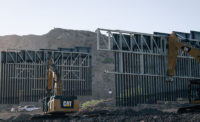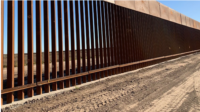The U.S. Government Accountability Office denied a protest by federal border wall contractor Fisher Sand & Gravel of a barrier contract awarded to competitor Southwest Valley Constructors despite its $33.5-million higher price. GAO said the price premium was warranted by "substantial qualitative differences” between the two firms' task-order proposals.
The fixed-price, design-build task order at issue was for a 13-mile section of border wall in Laredo, Texas. Fisher was notified of the selection on Sept. 28. Six companies submitted proposals to the US Army Corps of Engineers in response to an Aug. 28 request for proposals.
After Fisher's bid protest in early October, the Corps notified Southwest Valley to stop work on the contract. GAO decided the protest in early January, but did not release its public redacted version until Feb. 26.
A Corps spokeswoman told ENR on March 5 that Southwest received notice to proceed on Jan. 15, which was suspended on Jan. 23 after President Joe Biden issued an executive order three days earlier halting all border wall work.
All wall contracts remain halted and are under review by the Biden Administration through late March. According to media reports and local sources, no border wall construction in Laredo is visible.
The award to Southwest Valley, a unit of Kiewit Corp., was based on a best-value tradeoff between the proposers’ risk mitigation plan and their management plan which together were of equal importance to price, according to the Corps. Small business participation was the least important factor.
Evaluation Challenged
Fisher protested the Corps evaluation of its proposal, saying the agency failed to reasonably document its best-value tradeoff determination. The company claimed the Corps assigned a higher rating to the proposal Fisher submitted “on a nearly identical border wall solicitation” and that the Corps assignment of a rating for the Laredo wall contract was unreasonable.
Fisher had the lowest price proposal at $175 million. Southwest Valley bid $208.5 million, but it had the most highly-ranked technical proposal for its risk mitigation plan and management plan, according to the GAO decision.
Fisher’s risk mitigation plan and management plan were both rated “acceptable,” while those submitted by Southwest Valley were rated “good.” A good rating indicated a “thorough approach and understanding of” the objectives, while an acceptable rating reflected an “adequate approach and understanding of” the objectives, the GAO decision explained.
The narrative provided by Southwest Valley for risk mitigation significantly exceeded those of other offerors, the Corps said. The contractor "also clearly considered and identified risks specific to this project," said the agency. "These identified risks and how [Southwest Valley] intends to mitigate them increase the government’s confidence that [the firm] will be able to overcome construction challenges and complexities in these areas,” the Corps said.
Fisher did not discuss or consider two important risks, which were redacted from the publicly released GAO decision, or any other risks that were specific to the project, the Corps said. The agency's source selection advisory council said it was concerned about the impact that could have on the government.
Southwest Valley also had a much stronger management plan proposal, the Corps said. The firm "appears to have spent time considering ways to manage the project to ensure successful performance," said the agency. In contrast, Fisher’s [management plan] "was less clear,” the Corps said. Fisher met minimum requirements of the RFP but did not provide much detail, the Corps said.
GAO Explanation
In its decision, GAO said Fisher had a slightly better small-business participation proposal, but it did not provide letters of commitment from companies, which does not assure the contractor will exceed the RFP’s goals, GAO said.
The Corps responded to Fisher’s complaint that it had higher ratings on a similar wall barrier proposal and therefore should have had higher ratings on the Laredo proposal by saying that "as a general matter, the technical evaluation of an offeror's proposal is a matter within the agency's discretion, and a protester's disagreement with the agency's judgement does not establish that the evaluation is unreasonable."
GAO agreed that Fisher’s complaints regarding the non-price ratings it received in the Laredo procurement failed to state a valid basis for protest.
Fisher also claimed the best-value tradeoff determination was unreasonable, saying the Corps failed to give sufficient consideration to price and that there were only minor technical differences between the two proposals.
The Corps said it specifically considered the magnitude of Southwest Valley's price differential but concluded that multiple beneficial aspects of the firm’s technical proposal warranted the premium.
Southwest Valley's proposal had a detailed discussion of the specific risks associated with the Laredo procurement, while Fisher’s proposal primarily addressed risks that are common to all border wall contracts, GAO said.
GAO also said it found no basis to question the Corps determination of the evaluated strengths in Southwest Valley’s proposal or the price premium.
Fisher did not return a request for comment on the GAO decison.






Post a comment to this article
Report Abusive Comment